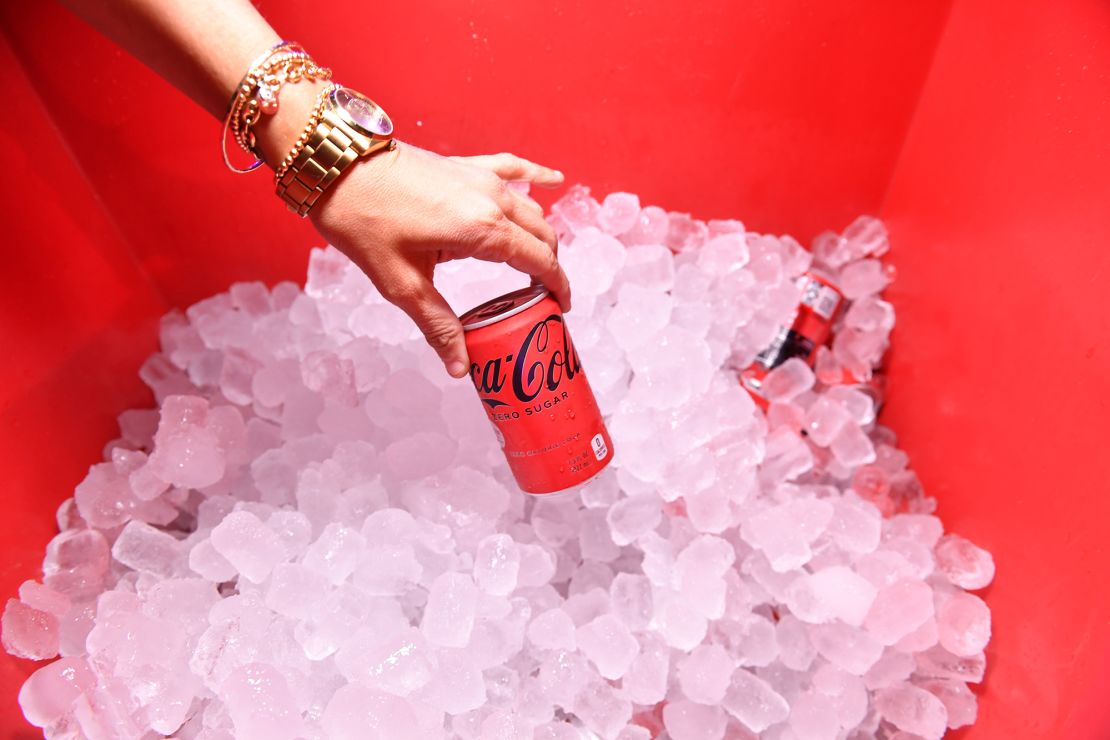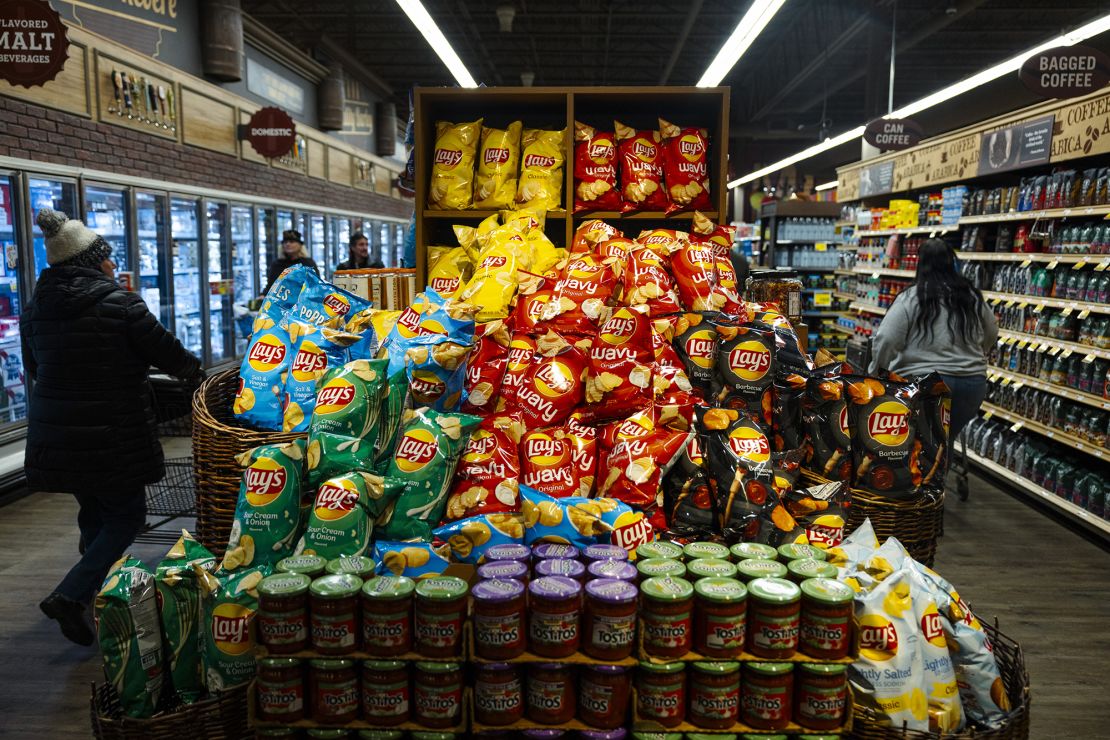
This article is more than
1 year old
Both Coca-Cola and Dr Pepper said last week on quarterly earnings calls that they sold more soda cases last quarter. During the third quarter of this year, total soft drink volumes grew 1.3% from a year ago, according to data from Evercore ISI.
It’s a comeback for soda, which was in decline for two decades over the health effects of sugary drinks. Frequently drinking sugar-sweetened beverages like soda is associated with a range of chronic health problems, including weight gain, obesity, type 2 diabetes and heart disease, according to the Centers for Disease Control.“This is so different than five, ten years ago,” said Robert Ottenstein, an analyst at Evercore ISI. “There’s been a huge change in attitude. These products were declining 4% a year for a long time.”
The World Health Organization also said last year for the first time that aspartame, a popular artificial sweetener found in diet sodas, should be categorized as “possibly carcinogenic to humans.”
But consumers right now seem willing to brush off health concerns. They view sugary Coke and Dr Pepper, or newer sugar-free sodas like Coke Zero, as a more affordable treat than other choices like an energy drink, flavored tea, a bag of chips or a candy bar.
The average price of 16 ounces of potato chips in September was $6.46, while a 2-liter soft drink was $2.00, according to the Bureau of Labor Statistics.

New marketing and renewed interest from younger consumers are also boosting soda brands.
Soda’s growth comes as consumers are closely watching their purchases and passing up anything they don’t perceive as a good deal. Companies have hiked prices by as much as 40% since the pandemic began in 2020, and consumers are walking away from brands whose prices they feel have gotten out of control. They’re also eating out less, making quicker trips to the store — rather than loading up their carts with expensive grocery hauls — and buying stores’ cheaper private-label brands.
“The carbonated soft drinks category is outperforming our expectations,” Timothy Cofer, the CEO of Dr Pepper parent company Keurig Dr Pepper, said on an earnings call. Soft drinks’ low prices position them to appeal to “value-seeking consumers,” he said.
It’s a reversal of years of declining soda sales.
In 2015, US per-capita consumption of soft drinks fell to its lowest level since 1986. Coca-Cola and Pepsi bought up flavored water, energy drink and other beverage lines to fuel growth, giving consumers more drink choices than ever.
But soda sales grew during the pandemic as consumers loaded up at grocery stores and returned to old favorites with restaurants closed. More recently, soft drink sales have been aided by lower- and middle-income consumers seeking inexpensive indulgences, companies and analysts say.
In some cases, consumers may be switching from more expensive energy drinks to a cheaper can of soda to get their caffeine rush. “Middle and lower-income consumers that are frequent users of energy drinks are moving into soft drinks,” said Duane Stanford, the editor of Beverage Digest, a trade publication.

Coke Zero and Dr Pepper Creamy Coconut
Soda’s comeback has also been bolstered by the rapid growth of sugarless sodas like Coke Zero Sugar. Coke Zero’s volume increased 11% last quarter, the company said. Regular Coke’s volumes were flat, while Diet Coke grew.
Zero-sugar sodas have been the biggest growth areas for the industry, said Stanford. Coke started the trend in 2005, and gave Coke Zero a makeover in 2021 to make it taste and look more like regular Coke.
Although companies market no-sugar or diet sodas as better alternatives to full-sugar versions, they should not be considered healthier because they contain artificial sweeteners. Artificial sweeteners have been shown to have harmful effects on the gut and, counterproductively, can increase weight gain, said Laura Schmidt, a professor of health policy at the University of California at San Francisco’s medical school who studies the impact of sugar and the soda industry.
“Switching from one ingredient that causes harm to a different ingredient that causes harm isn’t a solution,” she said.
New marketing is also helping soda brands. Dr Pepper’s “Creamy Coconut” limited-time version boosted sales, and its new Canada Dry “Fruit Splash” flavor was its “most significant launch in years,” CEO Cofer said. The company also redesigned 7Up cans for the first time in a decade.
Dr Pepper last year surpassed Pepsi as the second biggest soda brand in America behind Coke. Dr Pepper has invested heavily in marketing during college football games and come up with novel flavors like strawberries and cream to entice soda drinkers.
While consumers are drinking more Coke, Coke Zero, Dr Pepper and Canada Dry, Pepsi’s soda sales are struggling.

PepsiCo has focused on marketing and investing in snack brands in the United States at the expense of sugary soda brands, analysts say. Food has grown to make up 59% of PepsiCo’s sales.
Unlike Coca-Cola and Keurig Dr Pepper, Pepsi has a massive food business — its sprawling portfolio includes Quaker, Frito-Lay and more. When it comes to drinks, it seems to be focused on investing in its zero-sugar lines of Gatorade and other brands over regular Pepsi, analysts say.
‘Diet Coke Break’
“Dirty soda,” a popular TikTok trend that combines soda with syrup and cream, has also driven interest in soda brands among younger consumers interested in creating their own soda concoctions.
“Dirty soda” has become popular in Mormon culture, where the faith prohibits consuming coffee and alcohol. But thanks to Mormon influencers on TikTok and the Netflix show “The Secret Lives of Mormon Wives, the sugary drinks are becoming more and more mainstream. Dr Pepper launched its “Creamy Coconut” drink over the summer to capitalize on the dirty soda trend.
TikTok has also recently become filled with “Dirty Diet Coke,” “Crispy Diet Coke” and “DietCokeBreak” recipe videos where people leave cans of Diet Coke in the fridge for weeks and then pour them into a glass, sometimes with citrus powder, to get the most fizziness.
Singer Dua Lipa gave Coke its latest viral hit this month when she posted a video sharing her Diet Coke recipe, which combines Diet Coke, pickle juice and jalapeño sauce. It has 10 million views on TikTok and sparked responses from celebrities like Gordon Ramsay, who spit out the drink and warned the recipe would “ruin your vocal cords.”
“I don’t want to say I started the Diet Coke break, but I think I sort of did,” Kristen Hollingshaus, a social media influencer known as the “Diet Coke Girl,” told CNN.
In 2021, she began posting videos of herself on TikTok taking a pause during the day to drink Diet Coke. But it wasn’t just any can of Diet Coke. She “made it special” by pouring out the Diet Coke into a glass, adding ice and True Lime powder. Her posts gained traction online, with some racking up more than two million views, and she began a paid partnership with Diet Coke over the summer.
“This was mindfulness for me,” she said of her Diet Coke breaks. “It was taking a mindful five minutes out of my day to enjoy something.”
She typically drinks a Diet Coke a day and does not worry about the health impact.
“I think there are vices out there that are so much worse than a Diet Coke,” she said.
CNN’s Ramishah Maruf contributed to this article.